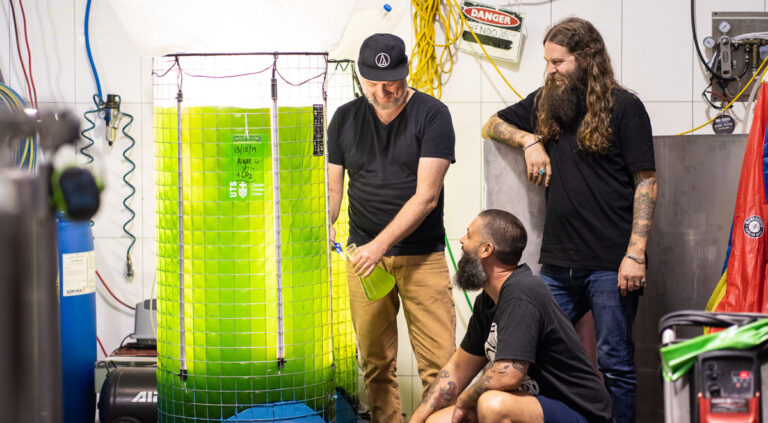Australian brewery Young Henrys is using algae to tackle beer’s carbon footprint
The year is 2021 and one of Sydney’s most popular breweries is decked in fluorescent green tanks. It looks surreal but isn’t born out of mere love for sci-fi movies, but rather out of a commitment to the future in the fight against climate change.
Partnering with scientists from the Climate Change Cluster (C3) at the University of Technology Sydney, Young Henrys, a craft brewery based in Newtown, has found a way to make beer brewing a more carbon-neutral process. Installing 400-litre bioreactors on-grounds, a small corner of their brewery is doused in fluorescent green illuminating out of transparent cylinders that don’t come in contact with any other fermenters. Is it Midori? Absinthe, perhaps? Nope, just algae with the potential of saving our planet one beer at a time.
LIQUID GOLD... or should we say liquid green?
— Young Henrys (@younghenrys) May 28, 2021
Our partnership with UTS Science allows us to house two algae tanks at our Newtown brewery, which bubble away, producing oxygen which offsets the CO2 from brewing.
To learn more head to: https://t.co/qybuTrqsua pic.twitter.com/1x2rS1cTGv
Despite accounting for only 1/60th of the biomass of plants, algae is credited with producing half of the world’s oxygen via photosynthesis. In this regard, every second breath you take is being powered by the likes of kelp, spirulina and nori. In addition, algae ingests CO2 to multiply—in turn making it an ideal ingredient in food, pharmaceuticals and bio-plastics.
There are two main types of algae: macro-algae, which consists of kelp and seaweeds, and micro-algae (also known as phytoplankton) which are tiny, microscopic plants that can grow both in fresh and saltwater. Young Henrys’ bioreactors contain the latter. Each millilitre of the 400-litre cylinders contain roughly 5 million micro-algae cells or individual organisms. This totals up to 2,400 trillion cells per cylinder—producing the same amount of oxygen as one hectare of Australian forest.
“70 per cent of the planet is water and that’s where the phytoplankton are growing,” said Professor Peter Ralph from the University of Technology Sydney to the BBC. “So one of the things that we can do to address climate change is to actually use algae to capture the CO2.” In the same interview, Oscar McMahon, one of the co-founders of the brewery, explained how Young Henrys taps algae’s potential as a “biochemical factory” to offset carbon emissions that arise as a byproduct of the brewing process to release oxygen instead.
The process can be broken down as follows: brewer’s yeast eats sugar to create alcohol and CO2 as a byproduct. This CO2 is then captured off the top of a beer fermenter and fed through the bioreactors which house micro-algae. “The algae eats CO2 to create more algae and release oxygen,” McMahon said. “So they become these yin and yang organisms that naturally balance each other out.”
Feeding algae one of the deadliest byproducts of the brewing process stops it from being released back into the atmosphere. This is a gamechanger considering how the carbon emissions from fermenting just one pack of beer takes a tree 48 hours to absorb. “That’ll be like knocking down a city block and planting trees and letting them grow for 20 years. And that’s something that can be made in our warehouse within weeks,” McMahon added, stressing its potential of becoming a mindblowing solution for the urban environment.
This World Environment Day, we couldn't shout louder about our sustainability initiatives which are making a difference by on our planet.
— Young Henrys (@younghenrys) June 4, 2021
Head to https://t.co/qybuTrqsua to learn more about what we're doing for Mother Earth 🌏 pic.twitter.com/ioXqtziqfZ
So what about its other byproduct: more algae? According to The Sydney Morning Herald, Young Henrys plans to use the additional algae to produce food, pharmaceuticals and bio-plastic, with help from folks over at the University of Technology Sydney’s Deep Green Biotech Hub. Doctor Janice McCauley, a research fellow at UTS, said the hub “strongly advocates” the use of algae more effectively than traditional crops. “Algae uses carbon dioxide from the air to create carbohydrates and oxygen, just like plants do, but at the moment, lots of things are really at their limits,” she said to The Sunday Morning Herald. “We’re currently utilising most of our arable land at the moment, but algae can be grown almost anywhere.”
Although micro-algae is already being used in the mussel and oyster industry, McCauley highlighted certain challenges including the dewatering process and the cost of growing them. “They’re microscopic organisms and this comes at a cost and an engineering challenge we need to face,” she added.
Credited as the first innovation towards carbon-neutral beers, McMahon hopes the bioreactors would encourage other breweries to cut their own carbon emissions. “The planet needs our help but the solutions are here now,” Professor Ralph added. “This is just the very, very beginning.”






